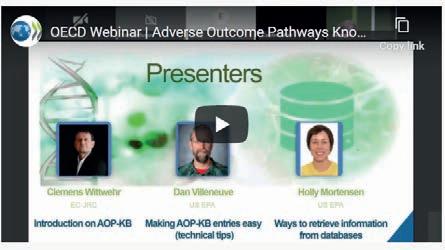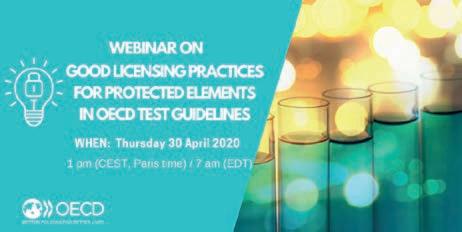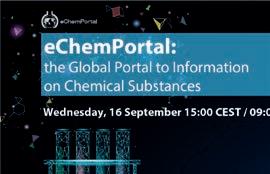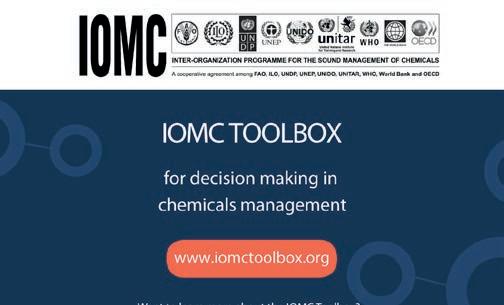
19 minute read
II.Assistance with Governance
Webinar Series on Testing and Assessment Methodologies: AOP Development Programme
A second webinar in the series of Adverse Outcome Pathways (AOPs) was organised on Wednesday 15 January 2020. It focused on the importance of weight of evidence in the process of developing AOPs, the types and lines of evidence assembled, examples demonstrating the lines of evidence and understanding why quantitative AOPs are developed.
https://oe.cd/testing-webinars

The third webinar in the series of Adverse Outcome Pathways (AOPs) was organised on Thursday 30 January 2020. It focused on the core information and telecommunication technologies applications that were built to support AOP development, management and dissemination. Tools and technical tips to facilitate scientifi c knowledge assembling and evaluations were also presented.
https://oe.cd/testing-webinars
Webinar Series on Emerging Science to Improve Chemical Safety: Promoting Good practices in the licensing of protected elements in Test Guidelines

The webinar was held on 27 April and was he opportunity to explain to the public, and especially test method developers the importance of establishing Fair, Reasonable and NonDiscriminatory conditions in licensing protected elements of a test method to the users. This ensures broad access to the new technologies contained in OECD Test Guielines. The recording of the webinar is available online:
https://oe.cd/science-webinars
Virtual Joint session of the Working Party on Hazard Assessment (WPHA) and the Extended Advisory Group on Molecular Screening and Toxicogenomics (EAGMST), 24 June 2020
This joint session was organised to discuss how the outputs of the OECD AOP programme can be better aligned to support regulatory needs of countries and how limited resources available for AOP reviews can be streamlined. The main conclusion of the session was that regulatory relevance should be an overarching consideration for AOP development and review, and good coordination between OECD groups is of great importance. Regulators noted that in order to increase the regulatory uptake of AOPs, those that are selected for review need to be integrated with test methods and IATA under development in other on-going projects.
The EAGMST agreed on a draft Guidance Document for conducting the scientifi c review of AOPs; the document will be published in the course of Q4 2020. This document will then help further develop collaborations with scientifi c societies who can support the scientifi c review. Further developments of the AOP-Knowledge Base were presented that are gradually increasing the user-friendliness of the platform and addressing the broad user community needs. There is now a large engagement of EAGMST members in leading various sub-groups, including on training the trainers, constant improvement and augmentation of the user handbook, and outreach to other communities like the research community on low radition eff ects.
The EAGMST held a special session on activities aiming at the development of reporting templates for ‘omics-type of data. Draft formats are under various stages of development and there was interest and discussions to start case studies on the application of ‘omics reporting formats jointly with the WPHA.
Virtual meeting of theValidation Management Group for Non-Animal testing (VMG-NA), 29 September 2020
No new projects that are directly relevant to the VMG-NA were proposed for the OECD Test Guideline Work Plan; however, the VMG-NA held a virtual meeting to discuss on-going projects in respective Member Countries that may be proposed as future OECD projects. The VMG-NA supported regular virtual meetings to provide relevant updates and addtional virtual meetings are anticipated for 2021.
Virtual Meeting of the Expert Group on Defi ned Approaches (DAs) for Skin Sensitisation, 22-23 June 2020
A meeting of the Expert Group on Defi ned Approaches for Skin Sensitisation (DASS) was held virtually to discuss outstanding technical issues needing resolution before a OECD DASS Guideline can be fi nalised. The two day meeting was augmented by teleconferences of the group held every two weeks for most of 2020. Substantial progress has been made regarding the curation of reference data, approaches for characterising uncertainty, and how DASS predictions can be used by regulators with varying needs for hazard identifi cation and characterisation. An updated Guideline and Supporting Document may be available for WNT approval in 2021.
This Series includes publications related to testing and assessment of chemicals; some of them support the development of OECD Test Guidelines (e.g. validation reports, guidance documents, detailed review papers).
No. 319 Report of the Peer Review of the Validation Status of the In Vivo Erythrocyte Pig-A Gene Mutation Assay No. 318 Guidance Document for the Testing of Dissolution and Dispersion Stability of Nanomaterials, and the Use of the Data for Further Environmental Testing and Assessment (Excel) No. 317 Guidance Document on Aquatic and Sediment Toxicological Testing of Nanomaterials No. 316 Series on Testing and Assessment The in vivo erythrocyte Pig-a gene mutation assay – Part 2 – Validation report No. 315 The in vivo erythrocyte Pig-a gene mutation assay –Part 1 – Detailed Review Paper and Retrospective Performance Assessment
No. 305 Report of the Peer Review Panel on the Validation of the Amino acid Derivative Reactivity Assay (ADRA) No. 304 Validation Study Report Of The Amino Acid Derivative Reactivity Assay (ADRA)
Forthcoming events
22-23 October 2020 Virtual Meeting of the Validation Management Group for Ecotoxicity testing
29-30 October 2020 Virtual Meeting of the Expert Group on skin sensitisation in vitro methods
9-10 November 2020 Virtual Meeting of the Expert Group on skin and eye irritation test methods December 2020 Virtual meetings of the Joint WNT-WPMN Expert Group on Physical-chemical properties of nanomaterials
20-23 April 2021 Location to be determined Meeting of the Working Group of the National Coordinators of the Test Guidelines Programme (WNT-33)
Contacts
Anne GOURMELON Mar GONZALEZ
Nathalie DELRUE Magdalini SACHANA
Leon Van DER WAL Patience BROWNE
Yusuke Oku
Website
Carole GUERRIER
www.oecd.org/chemicalsafety/testing/
2.
The Working Group on Good Laboratory Practice (GLP) works to facilitate and support the implementation by Member countries and interested non-members of the Council Acts related to Mutual Acceptance of Data (MAD), by promoting a common understanding of, and harmonised approaches to, technical and administrative matters related to Good Laboratory Practice and monitoring of compliance with the GLP Principles. These Principles are quality standards for the organisation and management of test facilities and for performing and reporting studies.
On-site evaluations
Under OECD’s on-site evaluation activity, each GLP Compliance Monitoring Programme (CMP) in OECD and full adherent countries is evaluated every ten years. (The current ten-year phase began on 1 January 2018 and will conclude on 31 December 2027.) These evaluations enhance confi dence that receiving authorities are provided accurate and complete assessments of the conduct of non-clinical health and environmental safety studies and of the quality of the data. The programme of on-site evaluations of GLP compliance monitoring programmes in member and adhering nonmember countries continues, with seven on-site evaluations conducted in 2019: Brazil, Denmark (Chemicals and Pesticides), Denmark (Medical Products), France (Medical Products), Singapore, Turkey and the United States (Medical Products). Reports from these visits as well as the on-site evaluation of the Czech Republic that was conducted in 2018 were considered at the 34th meeting of the Working Group on GLP (17-18 February 2020; Sendai, Japan). Most signifi cantly, the 34th meeting concluded that Turkey’s GLP compliance monitoring programme (Turkish Accreditation Agency – TURKAK) - which had undergone its fi rst on-site evaluation - fully complies with the 1989 Decision-Recommendation of the Council on Compliance with Principles of Good Laboratory Practice. This means that non-clinical health and environmental safety test data generated in a test facility that is part of TURKAK’s programme and conducted according to OECD GLP and OECD Test Guidelines have to be accepted in OECD countries and nonmembers who adhere to the OECD system of Mutual Acceptance of Data (MAD). All on-site evaluation visits for 2020 have been postponed due to the COVID-19 pandemic.
Guidance Documents
The OECD Position Paper Regarding Possible Infl uence of Sponsors on Conclusions of GLP Studies, developed by a drafting group under the leadership of France (Medical Products) and the UK, was published on 7 May 2020. The document discusses the relationship between test facilities and sponsors, and how the GLP Principles provide a framework for ensuring the independence of study directors against possible undue infl uence (both intentional and unintentional) on the conclusions of GLP studies. This document presents possible scenarios in which the sponsor could possibly infl uence the outcome of a GLP study and the steps a test facility can take to maintain confi dence in the independence of the study director.
At the April, 2013 meeting of the Working Group, members agreed to develop a Frequently Asked Questions (FAQ) document – which would be amended from time to time – that responds to common questions raised by test facilities about the implementation of the OECD Principles on GLP. Version 5 of FAQs, developed by a Working Group drafting group lead by France (Medical Products), was published on 15 June 2020. This version contains questions and responses related to: computerised systems, archives, test items, organisation and personnel, Standard Operating Procedures and digital pathology.
A draft Advisory Document on Data Integrity - Defi nition and Guidance for Industry, developed by a drafting group led by the UK and France (Medical Products), was posted on the GLP public site for comments on 7 August 2020. The deadline for comments was 18 September. The guidance aims to promote a risk-based approach to data management that includes data risk, criticality and lifecycle. The guidance primarily addresses data integrity and not data quality since the controls required for integrity do not guarantee the quality of the data generated. A revised version will be considered at the 35th Working Group meeting (7-9 April 2021).
At the 34th Working Group meeting, members established sub-groups – lead by Belgium, France (Medical) and Switzerland - to follow up on new and emerging technologies that may pose a challenge for regulatory GLP compliance. This includes systems such as cloud-based-applications (e.g. SaaS), artifi cial intelligence for analyses of histopathology slides or similar, block chain for tracking documents (e.g. study plans or study reports) predictive models (e.g. QSAR), and other in silico testing or advanced technology equipment (e.g. next generation sequencing, etc.). The aim of the sub-groups is to monitor the status and issues associated with these technologies, and, when appropriate, propose the development of specifi c guidance to the Working Group for eventual publication. To support this work, questionnaires have been submitted to governments, test facilities and quality assurance associations to collect information on whether such technologies are currently used or will be in the near future, and whether use of such technologies may raise technical or regulatory issues in the context of GLP. Responses are due by 31 December 2020.
The 34th meeting also agreed to re-evaluate OECD Consensus Document No.4 on Quality Assurance (QA) to cover risk-based QA programmes and the need for, and possible contents in, a possible document about tools of quality improvement that could be used in GLP. A drafting group has been established to develop possible text that integrates all the relevant guidance in existing OECD documents (e.g., consensus documents, advisory documents, position papers, and FAQs) and possibly recent guidance developed on this topic by governments. A draft document will be considered at the 35th Working Group meeting.
In 2018, Working Group members agreed there would be value in developing a Best Practice Guide (BPG) or other approaches for imparting knowledge to individuals who may participate in on-site evaluation visits in the future, and what such guidance should include. The Working Group would also consider whether it would be best to present this information in a BPG for conducting on-site evaluations, on-line/e-learning training, in-person training, or a combination of these approaches for conducting on-site evaluations. In 2019, a short questionnaire was circulated to Working Group members to collect relevant information and the results were discussed at the 34th meeting. The Working Group agreed to the development of a new internal webpage that would include training and guidance documents that are currently available or will be generated in the future. An ad hoc subgroup, under the leadership of New Zealand, has been established to identify existing or develop new guidance, as well as organise a training session for new or less experienced evaluators just prior to the 35th Working Group meeting.
In March 2020, many members of the Working Group informed the Secretariat that they had received questions from test facilities asking about ways to address the challenges at GLP test facilities posed by the COVID-19 pandemic. In response, in April, the Secretariat conducted a survey of Working Group members to quickly compile ideas and suggestions members may want to consider if they need to respond to questions from test facilities. The responses were made available to Working Group members. In addition, a portion of the GLP public site has now been devoted to formal guidance issued by governments to test facilities in relation to COVID 19. The public site is updated as new information is provided.
The 14th OECD GLP training course was held in Cape Town, South Africa from 7-10 October 2019. This course was a four-day advanced training course for GLP inspectors, and comprised lectures and discussions focusing on practical aspects of GLP inspections as well as parallel workshops on how to select studies for a study audit, auditing a GLP study/data integrity, test and reference items, non-compliance decisions and computerised systems. The course, hosted by the South African GLP Compliance Monitoring Authority (South African National Accreditation System, SANAS), was attended by approximately 80 participants, representing 26 countries, including ten nonmembers.
The 15th OECD GLP training course will be held in Montreal, Canada from 24 to 28 October 2021. A steering group organising the training course met on 16 February before the 34th meeting of the Working Group and agreed the scope and plan for the training course, which was later agreed by the Working Group.
Recent publications - Series on Principles of Good Laboratory Practice (GLP) and Compliance Monitoring
The OECD Principles of Good Laboratory Practice (GLP) ensure the generation of high quality and reliable test data related to the safety of industrial chemical substances and preparations. The principles have been created in the context of harmonising testing procedures for the Mutual Acceptance of Data (MAD).
No. 21 Position Paper Regarding Possible Infl uence of Sponsors on Conclusions of GLP Studies
OECD Good Laboratory Practice: Frequently asked questions (FAQ)
Forthcoming events
7-9 April 2021 Montreal, Canada OECD GLP Training Course





Contacts





Richard SIGMAN Yusuke Oku
Website





www.oecd.org/chemicalsafety/ testing/good-laboratorypracticeglp.htm
3. Mutual Acceptance of Data (MAD) ASSISTANCE WITH GOVERNANCE . 22
The 1981 OECD Council Decision on the Mutual Acceptance of Data (MAD) is built on the OECD Test Guidelines and Principles of Good Laboratory Practice (GLP). It requires OECD governments to accept non-clinical environment and health safety data developed for regulatory purposes in another country if these data were generated in accordance with the Test Guidelines and GLP Principles, thus increasing effi ciency and eff ectiveness of chemical notifi cation and (re-) registration procedures for governments and industry. A 1989 Council Decision-Recommendation on Compliance with GLP sets the framework for recognition of compliance assurance among governments. The MAD system has been open to non-OECD countries since 1997.

On 4 September 2020, Thailand accepted the invitation of the Council to become a full adherent to the OECD Council Acts related to the Mutual Acceptance of Data in the Assessment of Chemicals and to join that part of the Chemicals Programme related to MAD, with all of the rights and obligations of member countries. This means that Thailand – like Argentina, Brazil, India, Malaysia, South Africa and Singapore – now takes part as an Associate in that part of the Joint Meeting of the Chemicals Committee and Working Party on Chemicals, Pesticides and Biotechnology that concerns MAD, as well as in the Working Groups on Good Laboratory Practice and of National Test Guideline Co-ordinators. Read the press release
There are now seven partner countries that are full adherents to MAD: Argentina, Brazil, India, Malaysia, Singapore, South Africa and Thailand. Non-clinical health and environmental safety data generated in these countries must be accepted for regulatory purposes in OECD and other adhering countries. At the moment, full adherence for Argentina only applies to industrial chemicals, pesticides and biocides.
The Secretariat continues to work with several other countries in view of their possible provisional adherence to the MAD Council Acts.
Contacts
Richard SIGMAN Yusuke Oku
4.Evaluation and updating of legal instruments (“acquis”) on chemicals ASSISTANCE WITH GOVERNANCE . 23
With a view to strengthen and maximise the impact of OECD legal instruments, an OECD-wide standardsetting review was launched by means of letters sent by the Secretary-General to all Chairs of substantive Committees. The goal of the review is to ensure that OECD legal instruments continue to respond, in a timely manner, to the new challenges that governments are facing, thereby strengthening their impact and relevance for the Membership and beyond.
In 2018, the 57th Joint Meeting supported an initiative to address issues associated with intellectual property rights (IPR) and data access related to chemical safety data, and to the establishment of an ad hoc group of experts to carry out this work. The 58th Joint Meeting supported a proposal from the ad hoc group to develop an updated version of the 1983 Recommendation of the Council concerning the Protection of Proprietary Rights to Data submitted in Notifi cations of New Chemicals [OECD/LEGAL/0203] and to consider developing a separate Best Practice Guide (BPG) that could accompany an updated Act, in parallel with, or subsequent to, updating the Act. Draft text prepared by the ad hoc group for a possible updated Council Act was considered at the 59th and 60th Joint Meeting. The 60th Joint Meeting in February 2020 also considered possible elements and examples that could be included in a BPG. Following the 60th Joint Meeting, the ad hoc group has worked to reach a consensus on the draft text for the Act as well develop new text for the BPG. The Secretariat aims for an adoption of the revised Council act and publication of the BPG in Q1 or Q2 2021.
Contacts
Richard SIGMAN Berrak Eryasa
Website
www.oecd.org/chemicalsafety/oecdcouncilactsrelatedtochemicals.htm
5.Methodologies for assessing the costs and benefi ts of managing chemicals ASSISTANCE WITH GOVERNANCE . 24
Work under this broad topic includes analysis of the current methods used to estimate the economic benefi ts and costs of protecting human health and the environment from chemicals in the context of a chemicals management framework. This addresses cost-benefi t methods for regulating individual chemicals as well as methods for estimating the costs and benefi ts for setting up or improving overall chemicals management systems. Based on this research work, best practices to assess the quantifi able benefi ts and costs of chemical management programmes could be developed. It is envisaged to be undertaken in collaboration with EPOC and their Working Party on Integrating Environmental and Economic Policies (WPIEEP).
Design of coordinated valuation studies
The Joint Meeting and the Environmental Policy Committee’s Working Party on Integrating Economic and Environmental Policies are collaborating on the design of coordinated valuation studies. This entails the conduct of several valuation studies (e.g. studies surveying the willingness to pay to avoid certain health impacts or environmental outcomes) with a focus fi rst on morbidity endpoints relevant to chemicals exposure in diff erent OECD countries. The concept is to coordinate the development of the survey instrument, implement the survey using the consolidated instrument and analyse and compare the valuation results. Additional endpoints, including environmental endpoints, could then be considered.
A project team for this initiative held virtual workshops in April 2020 to discuss five survey instruments for endpoints including asthma, chronic kidney disease, I.Q. loss, fertility loss, (very) low birth weight. The surveys are expected to be launced in 2021, along with the consideration of additional endpoints for valuation.
Contacts
Eeva LEINALA Marie-Ange BAUCHER
Website
www.oecd.org/chemicalsafety/sacame.htm
III.Support for Capacity Building
1. eChemPortal
The OECD eChemPortal, launched in 2007, off ers free public access to information on properties and hazards
of chemicals. It provides direct access to critical scientifi c information prepared for government chemical review programmes. eChemPortal allows for simultaneous search of data from multiple international databases and provides clearly described sources and quality of data.
eChemPortal version 3.0 was released in February 2020. This major release includes modern user interface technology, refreshed design, improved navigation, and alignment of the eChemPortal chemical property search fi elds to the OECD Harmonised Templates 2018.
Four new data sources began participating in Q1 and Q2 2020:
US EPA Chemicals Dashboard
U.S. EPA ECOTOX database
German ETOX database
WHO/ILO International Chemical Safety Cards database (soon also in the Classifi cation search)
Green Talks LIVE webinar
A webinar, Green Talks LIVE | eChemPortal: the Global Portal to Information on Chemical Substances, was organised on 16 September 2020 to present the objective of the eChemPortal, how it contributes to sustainable development by protecting human health and the environment from risks of chemicals, avoiding duplication of eff ort and reducing animal testing. Gerlinde Knetch (Germany), Jake Sanderson (Canada) and Violaine Verougstraete (Eurometaux) shared their experience in improving chemical safety and how the eChemPortal supported this process.


The recording of the webinar can be found here.
Fothcoming event
20-21 April 2021 (tentative) OECD, Paris Meeting of the Steering Group for the Development of the Global Portal
Contact
Sally DE MARCELLUS Valérie FRISON
Website
www.echemportal.org/




